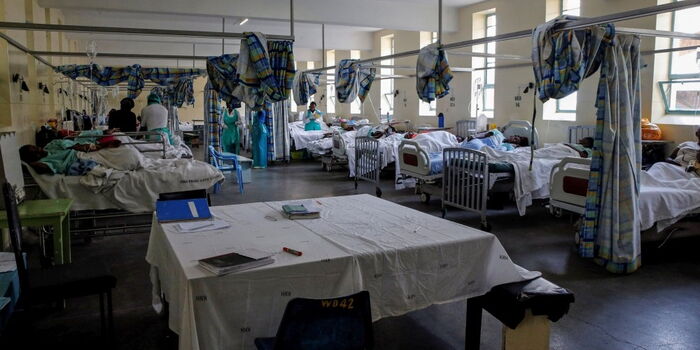Kenya is facing a nationwide stockout of the Bacillus Calmette–Guérin (BCG) vaccine with newborn babies being discharged without getting the critical vaccine that aids in the prevention of Tuberculosis in infants, it has now emerged.
The fresh crisis is reportedly the second stockout of the important vaccine in 2024 with hospitals calling for an immediate arrest of the situation.
The shortage has left Kisumu and Baringo as the most affected counties in the country with health stakeholders calling out the government on the over-reliance of donors to partially fund critical areas in healthcare.
At the Kisumu County Hospital, the shortage of the BCG vaccine, which is one of the three vaccines administered at birth, has forced the hospital to register mothers directing them to avail their infants for vaccination in January.
A nurse administering a vaccine to a baby at a Nairobi hospital on April 16, 2021.
Photo
UNICEF Kenya
This move is seen as a big risk as it leaves the newborns highly vulnerable to contracting the dangerous disease while also leaving a huge burden on their mothers who are still in the early stages of their postpartum recovery.
“They told us to come back in January for the vaccines but personally for me I’m still recovering from giving birth and I might not have the strength to come back at the required time,” one mother at the hospital lamented.
“It would be better if they sent the (community) health workers to our doorsteps for the vaccination instead of telling us to come back to the hospital. It is more convenient that way,” another distressed mother commented.
Kisumu County Executive Committee Member (CECM) for Health Dr. Gregory Ganda confirmed the shortage which has persisted for a month citing delays in procurement of the vaccine at the national level.
Elsewhere, Baringo County also recorded a stockout in the BCG vaccine with tetanus and yellow fever vaccines also reported in short supply.
Kenya was first hit with a vaccine shortage in May this year after missing out on a year-long supply due to defaulting a Ksh2 billion debt to a global supplier. Aside from the defaulting, the vaccine supply shortage was compounded by the reduction of the vaccine budget from Ksh2.6 billion to Ksh1.2 billion.
However, the Ministry of Health moved to releasing Ksh1.25 billion bringing in 3.1 million doses of the BCG vaccine in June providing a temporary reprieve for mothers and newborns.
Kenya currently procures vaccines through a co-financing model with partners. However, the country entered an accelerated phase of support where the co-partners will co-fund vaccination costs until 2029. Even so, health stakeholders have called for greater transparency and management of the funds in the vaccine budget in order to curb future shortages.
Health Cabinet Secretary Deborah Mulongo during the launch of the Inaugural Open Digital Health Summit to Accelerate Healthcare Transformation in Nairobi on December 2, 2024.
Photo
Ministry of Health


